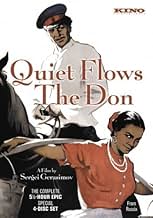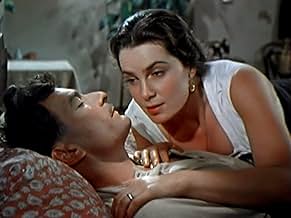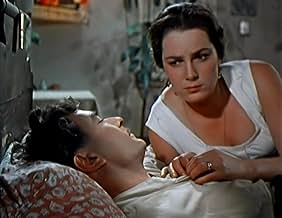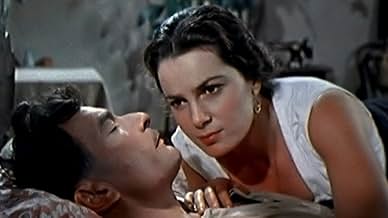IMDb रेटिंग
7.7/10
1.4 हज़ार
आपकी रेटिंग
अपनी भाषा में प्लॉट जोड़ेंAn epic story of shattered lives of the Don Cossacks through chaos of World War I, the Russian Revolution, and the following Civil War.An epic story of shattered lives of the Don Cossacks through chaos of World War I, the Russian Revolution, and the following Civil War.An epic story of shattered lives of the Don Cossacks through chaos of World War I, the Russian Revolution, and the following Civil War.
- निर्देशक
- लेखक
- स्टार
- पुरस्कार
- कुल 1 जीत
Daniil Ilchenko
- Panteleimon Prokofyevich Melekhov
- (as D. Ilchenko)
Anastasia Filippova
- Ilyinichna - maty
- (as A. Filippova)
Pyotr Glebov
- Grigoriy Melekhov
- (as P. Glebov)
Nikolai Smirnov
- Pyotr Melekhov
- (as N. Smirnov)
Lyudmila Khityaeva
- Dariya - zhena Melekhova
- (as L. Khityayeva)
Natalya Arkhangelskaya
- Dunyashka Melekhova
- (as N. Arkhangelskaya)
Aleksandr Blagovestov
- Stepan Lekatov
- (as A. Blagovestov)
Elina Bystritskaya
- Aksiniya
- (as E. Bystritskaya)
Aleksandr Zhukov
- Miron Koshevoy
- (as A. Zhukov)
Aleksandra Denisova
- Lukinichna
- (as A. Denisova)
Zinaida Kirienko
- Natalya Melekhova
- (as Z. Kiriyenko)
Boris Novikov
- Mitka Korshunov
- (as B. Novikov)
Aleksandr Karpov
- ded Grishaka
- (as A. Karpov)
Yelena Maksimova
- maty Koshevogo
- (as Ye. Maksimova)
Gennadi Karyakin
- Mikhail Koshevoy
- (as G. Karyakin)
Valentina Khmara
- Mashutka Koshevaya
- (as V. Khmara)
Pyotr Chernov
- Ilya Bunchuk
- (as P. Chernov)
फ़ीचर्ड समीक्षाएं
SYNOPSIS The lives and loves of Russian Cossacks living on the eastern steps of Russia during the Russian Revolution.
CONCEPT IN RELATION TO THE VIEWER How events beyond our control and the judgment of others shape our lives in the long term. No matter how hard we try, sometimes fate controls our destiny.
PROS AND CONS This is a great film, not because of it's acting or screenplay, but because it shows the western world that there were important events in the past that we have little knowledge of. It opens a doorway to us that we never knew existed and lets us glimpse some of the reasons that others think differently than we do.
During the late 1950 the Soviet Union was keen to copy everything that the west did regarding popular culture to show that they could do it just as well as the Americans and the Europeans. They sort of had a chip on their shoulder and wanted to prove that they were good enough to run with the big boys. In response to films such as "Ben Hur" and "Gone With The Wind", they geared up their own state sponsored film industry to produce 'epics'. This is one of them. Five and a half hours of the Russian experience in grand scope and scale.
Some have said that this is the Russian version of "Gone With The Wind", but it is more closely tied to "Dr. Zhivago" in theme and tone. The film deals with a portion of history rarely seen in the west. The internal struggles of a nation in the midst of Civil War in what could best be described as the Wild West of Russia.
This film is long with slow pacing. Russian cinema does not move a story along at a fast pace. Characters are built slowly and relationships between them are complex and wide ranging. The scenery is beautiful but sparse, as befits the Russian hinterlands. This is mostly a rural 'people' film, without much else to distract the audience, such as machinery or large scenes in cities. It is intimacy played out on a very broad canvas.
One of the more peculiar things about this version of the film is the narration. The film is shown in it's original language with no subtitles. The characters are narrated, not voiced over. So when someone speaks, it is in their native tongue, and then an English voice speaks what they are saying, sort of like you are reading their mind in delayed time. It preserves more of the feel of the film, but takes a little getting used to.
The other thing that was noticeable about the film was the Foley work. Sounds such as breaking glass or gun shots were VERY loud and distracted from the film at times. In a fist fight early in the film, the sounds of fists hitting the actors faces sounded like a sack of rice dropped from two stories up and hitting a wooden floor.
Unless you watch this film very closely, without distraction, it is easy to get lost in the complexity of the story. I was often left wondering who were the Reds (Communists) were and who were the Whites (Loyalists) and who was fighting whom. This film assumes that the audience has a good understanding of this time in Russian history, much like most American audiences have a good understanding of who Benjamin Franklin and Paul Revere were.
What this film left me with was a better understanding of the mind set of the Russian people and how they perceive their world and their place in it. They are pragmatic for a reason and see the journey of life as a hard and difficult thing. There is no "pursuit of happiness" in their character. There is only finding happiness where it lays and enjoying it while you can.
CONCEPT IN RELATION TO THE VIEWER How events beyond our control and the judgment of others shape our lives in the long term. No matter how hard we try, sometimes fate controls our destiny.
PROS AND CONS This is a great film, not because of it's acting or screenplay, but because it shows the western world that there were important events in the past that we have little knowledge of. It opens a doorway to us that we never knew existed and lets us glimpse some of the reasons that others think differently than we do.
During the late 1950 the Soviet Union was keen to copy everything that the west did regarding popular culture to show that they could do it just as well as the Americans and the Europeans. They sort of had a chip on their shoulder and wanted to prove that they were good enough to run with the big boys. In response to films such as "Ben Hur" and "Gone With The Wind", they geared up their own state sponsored film industry to produce 'epics'. This is one of them. Five and a half hours of the Russian experience in grand scope and scale.
Some have said that this is the Russian version of "Gone With The Wind", but it is more closely tied to "Dr. Zhivago" in theme and tone. The film deals with a portion of history rarely seen in the west. The internal struggles of a nation in the midst of Civil War in what could best be described as the Wild West of Russia.
This film is long with slow pacing. Russian cinema does not move a story along at a fast pace. Characters are built slowly and relationships between them are complex and wide ranging. The scenery is beautiful but sparse, as befits the Russian hinterlands. This is mostly a rural 'people' film, without much else to distract the audience, such as machinery or large scenes in cities. It is intimacy played out on a very broad canvas.
One of the more peculiar things about this version of the film is the narration. The film is shown in it's original language with no subtitles. The characters are narrated, not voiced over. So when someone speaks, it is in their native tongue, and then an English voice speaks what they are saying, sort of like you are reading their mind in delayed time. It preserves more of the feel of the film, but takes a little getting used to.
The other thing that was noticeable about the film was the Foley work. Sounds such as breaking glass or gun shots were VERY loud and distracted from the film at times. In a fist fight early in the film, the sounds of fists hitting the actors faces sounded like a sack of rice dropped from two stories up and hitting a wooden floor.
Unless you watch this film very closely, without distraction, it is easy to get lost in the complexity of the story. I was often left wondering who were the Reds (Communists) were and who were the Whites (Loyalists) and who was fighting whom. This film assumes that the audience has a good understanding of this time in Russian history, much like most American audiences have a good understanding of who Benjamin Franklin and Paul Revere were.
What this film left me with was a better understanding of the mind set of the Russian people and how they perceive their world and their place in it. They are pragmatic for a reason and see the journey of life as a hard and difficult thing. There is no "pursuit of happiness" in their character. There is only finding happiness where it lays and enjoying it while you can.
This is a 6 hour flick of three episodes.
1 Pre WW1, the way of life,the lives and loves
of the rural Cossack village.
2 Mobilization, WW1, defeat
3 The end of WW1, revolution,chaos, civil war, changing fortunes, Bolshevik Victory. The turbulence of Cossack life during this time.A bit of propaganda,but who cares?
This is the Russian Gone With the Wind.As good and maybe better. A vanished world. I had
seen it before,but this adaptation was better.Maybe the other was edited different or the subtitles are better? The flow of the story was better.Several characters from the home village appear again and again during the film. The main character is Grigory, a young rather wild Cossack, his next door married lover, his family selected wife.His large family gets a lot of time in this.A rather boring life is soon interrupted by war,revolution,counter revolution , Bolsheviks, white Russians,bandits and Communists. As things change, Grigory switches sides, his family and the Cossacks way of life is ruined. He loses everything. Well filmed,well acted,excellently scored, a cast of thousands.A classic Russian epic. Well worth watching. Epic War, history and love.You can't beat the combination.
The film contains 3 parts, each of which is close to 2 hours.
Here are what I like: 1. This film accurately depicted an agricultural society before the industrial revolution. People used oil lamps. Most people were not well educated. There was no sliced bread. You need to slice bread when you eat. People ate potato, bread, drank milk and soup. There were no in-door plumbing.
2. People's psyches were also very typical of a pre-industrial society. Everyone in the Cossack community were Orthodox Christian. The basic moral fiber was well and strong. Multi-generations lived in a large household. Young people were hooked up by marriage brokers. Young people needed family patriarch's blessing before they could marry.
In other words, you would feel people's psyches and the society at large were very much like the Chinese society before China felt the impact of industrial revolution.
I felt very familiar with the characters and their surroundings. In fact, I felt the men and women were so intimate to me, that I felt really strongly about their joy, anxiety, and anguish.
3. Politics was a central theme in this movie. The novel and the film did a great job in depicting the reality of Russia during the tumultuous years of War World I and the Civil War following the Boshevik revolution.
4. Watching the film, I hated the communists who pretended to be pacifists during War World I, and then showed their ugly face by pushing the country into a 3-year long extremely bloody civil war after War World I ended.
5. Overall, the protagonist, Grigory Melekhov, is a freedom loving, traditionalist with a humanist world view. The communists had the inhumane view of class warfare, and were power mongers.
6. It is amazing that the movie makers were able to make the movie without a single brush of communist propaganda. The movie didn't villanize either side. Nor did it promote, or aggrandize either side.
7. I didn't read the novel. It was said that the adaptation to film lost the richness of the novel. On the basis of the film, I'd say the story structure is a very good epic structure.
8. It is a very dramatic and moving story. With a lot of colorful characters, with rich and interesting characterizations.
9. The 4th DVD contains special features. There were an interview with Ellina Bystritskaya who played Aksinya and an interview with Zinaida Kirienko who played Natalya. Both interviews were done in 2002, I believe. They are quite interesting.
Here are what I felt could be better: 10. There is a soap opera feeling to the film. The characters are not very deep.
11. There were many drinking and eating scenes, which became repetitive.
12. The ending is not satisfactory. The novel was originally circulated in 1928, under Stalin's regime. It would have been banned in Soviet Union if it had a satisfactory ending to my taste. So, I really don't expect more.
13. All characters were quick at saying negative things, and none were good at saying positive things.
Here are what I like: 1. This film accurately depicted an agricultural society before the industrial revolution. People used oil lamps. Most people were not well educated. There was no sliced bread. You need to slice bread when you eat. People ate potato, bread, drank milk and soup. There were no in-door plumbing.
2. People's psyches were also very typical of a pre-industrial society. Everyone in the Cossack community were Orthodox Christian. The basic moral fiber was well and strong. Multi-generations lived in a large household. Young people were hooked up by marriage brokers. Young people needed family patriarch's blessing before they could marry.
In other words, you would feel people's psyches and the society at large were very much like the Chinese society before China felt the impact of industrial revolution.
I felt very familiar with the characters and their surroundings. In fact, I felt the men and women were so intimate to me, that I felt really strongly about their joy, anxiety, and anguish.
3. Politics was a central theme in this movie. The novel and the film did a great job in depicting the reality of Russia during the tumultuous years of War World I and the Civil War following the Boshevik revolution.
4. Watching the film, I hated the communists who pretended to be pacifists during War World I, and then showed their ugly face by pushing the country into a 3-year long extremely bloody civil war after War World I ended.
5. Overall, the protagonist, Grigory Melekhov, is a freedom loving, traditionalist with a humanist world view. The communists had the inhumane view of class warfare, and were power mongers.
6. It is amazing that the movie makers were able to make the movie without a single brush of communist propaganda. The movie didn't villanize either side. Nor did it promote, or aggrandize either side.
7. I didn't read the novel. It was said that the adaptation to film lost the richness of the novel. On the basis of the film, I'd say the story structure is a very good epic structure.
8. It is a very dramatic and moving story. With a lot of colorful characters, with rich and interesting characterizations.
9. The 4th DVD contains special features. There were an interview with Ellina Bystritskaya who played Aksinya and an interview with Zinaida Kirienko who played Natalya. Both interviews were done in 2002, I believe. They are quite interesting.
Here are what I felt could be better: 10. There is a soap opera feeling to the film. The characters are not very deep.
11. There were many drinking and eating scenes, which became repetitive.
12. The ending is not satisfactory. The novel was originally circulated in 1928, under Stalin's regime. It would have been banned in Soviet Union if it had a satisfactory ending to my taste. So, I really don't expect more.
13. All characters were quick at saying negative things, and none were good at saying positive things.
Beautiful film and well-acted in a theatrical style that is common of many older Russian films. The story is long and involved, and an American audience will likely wonder what the point of the first 1/3 of the movie is about. As described by another, that portion of the film seems very much like a soap opera concerned with who is sleeping with whom. More importantly is how the scandal plays out in the families and village and how the characters are trapped within their lives, culture, communities, and expectations.
Americans and other westerners might also be surprised by the 2nd part of the film, which depicts the Bolshevik victory as far from certain, often challenged, with parties changing sides and allegiances as the war weary citizens fight on through tragedy after tragedy.
Overall, it's a brilliant film ... a technical and cinematic achievement, for sure. Comparisons to "Gone with the Wind" are entirely appropriate .. however, it is a "Gone with the Wind" with muscles, with combat, with blood, with real tragedy.
Americans and other westerners might also be surprised by the 2nd part of the film, which depicts the Bolshevik victory as far from certain, often challenged, with parties changing sides and allegiances as the war weary citizens fight on through tragedy after tragedy.
Overall, it's a brilliant film ... a technical and cinematic achievement, for sure. Comparisons to "Gone with the Wind" are entirely appropriate .. however, it is a "Gone with the Wind" with muscles, with combat, with blood, with real tragedy.
Those Soviets surely were not holding back spending their rubles on large scale productions at the time. This over 6 hour long epic production is not just epic in its running time. It's an epic movie in basically all of its sequences and the movie gets filled with some impressive battle sequences as well. The Soviets were basically the pioneers in how large scale battles and battle sequences in general got brought to the screen. Another and even better example (and longer) of this is the even larger 1967 Soviet movie production of war and peace; "Voyna i mir".
The way I see this movie it's basically a tribute to the Cossacks. They get presented as a proud, noble and hard working community of farmers, who fight and give their lives for mother Russia in its most dyer times. The backbone of Russia so to speak. Hyme to the Cossacks could had been a title for this time.
Appearantly there also is a short version of this all somewhere available for the international market, which is a good thing. Although the story is always great, 6 hours is of course a long time to watch anything. I can also imaging an 2 hour movie telling exactly the same story and just as good. The movie perhaps repeat itself too often and all that at times seems to be happening are a bunch of characters sitting around either eating, drinking or being depressed.
But no, it's not like the movie ever turns into a weak one. It's far too well done for that, even when the movie is turning slow. Its story and characters always make sure that you'll stay interested throughout.
A real large scale cinematic accomplishment about love and war, in the early 20th century southern Russia countryside.
10/10
http://bobafett1138.blogspot.com/
The way I see this movie it's basically a tribute to the Cossacks. They get presented as a proud, noble and hard working community of farmers, who fight and give their lives for mother Russia in its most dyer times. The backbone of Russia so to speak. Hyme to the Cossacks could had been a title for this time.
Appearantly there also is a short version of this all somewhere available for the international market, which is a good thing. Although the story is always great, 6 hours is of course a long time to watch anything. I can also imaging an 2 hour movie telling exactly the same story and just as good. The movie perhaps repeat itself too often and all that at times seems to be happening are a bunch of characters sitting around either eating, drinking or being depressed.
But no, it's not like the movie ever turns into a weak one. It's far too well done for that, even when the movie is turning slow. Its story and characters always make sure that you'll stay interested throughout.
A real large scale cinematic accomplishment about love and war, in the early 20th century southern Russia countryside.
10/10
http://bobafett1138.blogspot.com/
क्या आपको पता है
- ट्रिवियाOriginal Russian film is 340 minutes long (film length 9,582 m). It was reduced to 107 minutes for international distribution.
- कनेक्शनFeatured in Zhizn odna... (1987)
टॉप पसंद
रेटिंग देने के लिए साइन-इन करें और वैयक्तिकृत सुझावों के लिए वॉचलिस्ट करें
- How long is Quiet Flows the Don?Alexa द्वारा संचालित
विवरण
- चलने की अवधि
- 5 घं 30 मि(330 min)
- ध्वनि मिश्रण
- पक्ष अनुपात
- 1.37 : 1
इस पेज में योगदान दें
किसी बदलाव का सुझाव दें या अनुपलब्ध कॉन्टेंट जोड़ें



































